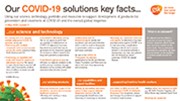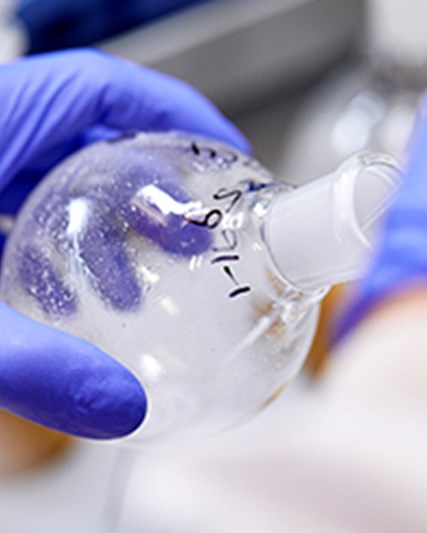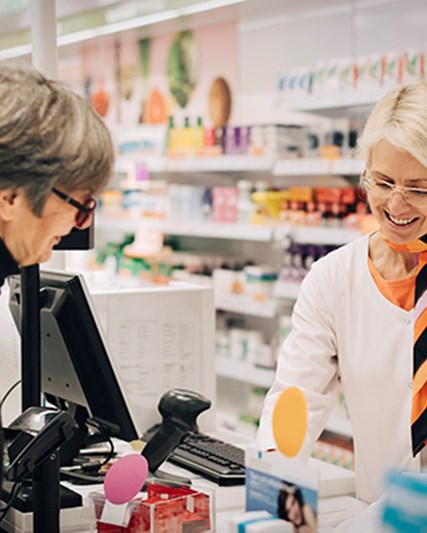GSK is closely monitoring the COVID-19 pandemic and is supporting global efforts to tackle the virus. Since the outbreak, we have been actively exploring ways to help, with our science and expertise, alongside protecting the health and wellbeing of our people and managing our global supply chains to support patients and consumers who depend on our products.

Our COVID-19 solutions
Using our science, technology, portfolio and resources to support development of products for prevention and treatment of COVID-19 and the overall global response.
Hear from our CEO, Emma Walmsley
Emma discusses GSK's response to COVID-19 including our collaboration with Sanofi to develop an adjuvanted COVID-19 vaccine, our commitment to access and investment in long-term pandemic preparedness.
Supporting research and production of candidate COVID-19 vaccines
We are collaborating with companies and research groups across the world working on promising COVID-19 vaccine candidates through the use of our innovative vaccine adjuvant technology. The use of an adjuvant is of particular importance in a pandemic situation since it may reduce the amount of vaccine protein required per dose, allowing more vaccine doses to be produced and therefore contributing to protecting more people.
We announced on 14 April that GSK has joined forces with Sanofi, bringing together two of the world’s largest vaccines companies in an unprecedented collaboration to fight COVID-19. The two companies combined their innovative technologies to develop an adjuvanted COVID-19 vaccine, which entered clinical trials in September 2020. If successful and subject to regulatory considerations, we aim to complete the development required for availability by the second half of 2021. This would be a significantly faster timeline than for normal vaccine development and teams from both companies are working on this urgently.
One of the important parts of this collaboration is our combined scale. Both companies bring significant manufacturing capacity and whilst we have a lot of work to do, given this is at an early-stage of development, we believe that, if successful, we will be able to make hundreds of millions of doses annually by the end of next year. Both GSK and Sanofi have a long history of making our vaccines available to people all around the world and we are committed to making any vaccine that is developed through this collaboration affordable and through mechanisms that offer fair access for all people.
In addition to Sanofi, we are also collaborating with the University of Queensland, Clover Biopharmaceuticals and Xiamen Innovax Biotech Co., Ltd. We believe that more than one vaccine will be needed and we’re hoping that there will be a number of successful vaccines developed with our pandemic adjuvant technology.
On 19th June, the scientific collaboration with Clover, using GSK’s pandemic adjuvant in combination with COVID-19 vaccine candidate SCB-2019, moved into phase I clinical trials. Over the next few months we expect to see data from many of these collaborations.
On 7 July, we announced a new collaboration with Canadian biopharmaceutical company, Medicago, to develop and evaluate a COVID-19 candidate vaccine combining Medicago’s recombinant Coronavirus Virus-Like Particles (CoVLP) with GSK’s pandemic adjuvant system. CoVLPs mimic the structure of the virus responsible for COVID-19 disease, allowing them to be recognised by the immune system. The companies will use Medicago’s innovative plant-based production technology to manufacture the COVID-19 vaccine antigen. The vaccine candidate will enter into Phase I clinical trials in mid-July.
We have confirmed our intention to manufacture 1 billion doses of our pandemic vaccine adjuvant system, in 2021, to support the development of multiple adjuvanted COVID-19 vaccine candidates. This follows completion of a review conducted across our global supply network. We will manufacture, fill and finish adjuvant for use in COVID-19 vaccines at sites in the UK, US, Canada and Europe.
Overall GSK does not expect to profit from our portfolio of collaborations for COVID-19 vaccines during this pandemic. As any short-term profit generated will be invested in support of coronavirus related research and long-term pandemic preparedness, either through GSK’s internal investments, or with external partners. Making our adjuvant available to the world’s poorest countries will also be a key part of our efforts, including donations of this adjuvant, by working with governments and the global institutions that prioritise access.
We have announced our approach to pricing and making our adjuvant available as part of our COVID-19 vaccine collaborations. Here, we explain some of the thinking behind it.
GSK developed the approach with the aim of recognizing the unprecedented scale of COVID-19, the huge impact it is having on people and healthcare systems, and the need to reinvigorate the world’s attention to long-term pandemic preparedness.
At the same time, we were also conscious that we needed to find a way to support the sustainability of our business model. A model that is founded on using at-risk capital, over many years, to invest in R&D, manufacturing and commercialization to deliver new innovations, like our pandemic adjuvant technology.
So, as a company, we’re really trying to strike a balance between generating an economic return and, reinvesting in our business over the long-term, whilst acting with urgency and responsibility to support governments, payers and people.
The approach also reflects GSK’s belief that more than one vaccine will be needed to help respond to COVID-19. We hope that there will be several vaccines developed that use our adjuvant technology.
The approach is blended around three commitments. First, GSK will supply our AS03 adjuvant to governments and institutions at a responsible price, either as standalone or as part of an adjuvanted vaccine. Our price is calculated using various inputs, including benchmarks to previous H1N1 contracts and our costs for production and development.
Second, we want to make our adjuvant available to all countries, including the world’s poorest nations. To help support low income countries, GSK will offer donations, again either as standalone or as part of an adjuvanted vaccine, to global institutions who can determine the need and help with delivery on the ground.
Third, short-term profits made on sales of our AS03 adjuvant during the COVID-19 pandemic phase will be invested to support long-term global pandemic preparedness. The world is learning from this pandemic and GSK wants to positively contribute to the ideas and the actions that will arise, once this crisis passes.
GSK believes there are many areas that should be looked at to help improve future pandemic preparedness whether that be support for new technology platforms that support rapid scale up, R&D into new pathogens, testing and diagnostics or increasing vaccine manufacturing capacity. Some of these are areas in which we can directly contribute, through investing in our own capabilities and infrastructure, other areas require different expertise. We will make investments inside and outside of GSK to support long-term pandemic preparedness.
Overall, taking all three commitments together, this means that GSK does not expect to profit from its portfolio of COVID-19 vaccine collaborations during the pandemic.
What is an adjuvant?
An adjuvant is added to some vaccines to enhance the immune response, thereby creating a stronger and longer lasting immunity against infections than the vaccine alone. The use of an adjuvant is of particular importance in a pandemic situation since it can reduce the amount of antigen required per dose, allowing more vaccine doses to be produced and made available to more people.
Screening and research into new medicines
In addition to Vaccines we are also supporting screening and research into potential medicines for COVID-19.
In April we announced a collaboration with Vir Biotechnology to use Vir’s monoclonal antibody platform technology to accelerate existing and identify new anti-viral antibodies that could be used as therapeutic or preventative options for COVID-19. Subject to regulatory review, the companies plan to proceed directly into a phase 2 clinical trial within the next three to five months.
GSK is also evaluating its marketed pharmaceutical products and medicines in development to determine if any could be used beyond their current indications in response to the pandemic. This includes medicines with potential direct anti-viral activity and those with possible utility in prevention or treatment of secondary complications of COVID-19.
Following this evaluation, we started a phase II clinical trial in May 2020 at sites in the United States (US) to assess whether one of our medicines currently in development – a monoclonal antibody – can help treat patients who are affected by secondary complications associated with COVID-19. In addition to the US, we intend to conduct the trial at sites in Europe, South America and Africa.
GSK is a member of the collaborative research effort, the COVID-19 Therapeutics Accelerator. The aim of the Accelerator is to bring pharmaceutical companies and expert academic institutions into coordinated research programs, with the aim of bringing the most promising molecules forward that could be used to treat cases of COVID-19. GSK will contribute by making available compounds from its libraries for screening for activity against COVID-19.
What is antibody therapy?
Our immune system fights infections by recognising antigens on the surface of invading viruses and bacteria. It makes antibodies to destroy antigens. Antibody therapy uses monoclonal antibodies which are produced, or cloned, from immune cells in a lab. By targeting specific antigens, they could help our immune system fight diseases such as COVID-19.
Helping frontline health workers and offering expertise
GSK is donating $10 million to The COVID-19 Solidarity Response Fund, created by the UN Foundation and WHO, to support WHO and partners to prevent, detect, and manage the pandemic, particularly where the needs are the greatest. Among its objectives, the fund will enable distribution of essential supplies such as personal protective equipment (PPE) to frontline health workers. GSK is also donating surplus reagents to support diagnostic testing to several countries and is preparing to do the same for surplus PPE.
We have also initiated new volunteering processes for people working at the company, to enable those with medical expertise to provide support to frontline health workers, whilst at the same time ensuring we protect supply and development of our medicines and vaccines. Initiatives have also been started to use salesforce personnel to help with delivery of PPE and testing equipment, and for specialists, such as procurement leaders, to work with national governments on developing supply chains.
Taking action to deliver high-demand consumer healthcare products
GSK Consumer Healthcare is prioritizing actions in its supply chain to deliver more products that are in high demand, due to COVID-19. This includes increasing production for pain relief brands such as Panadol and multi-vitamins and dietary supplements such as Emergen-C and Centrum.
GSK Consumer Healthcare has also entered in to a collaboration with Mammoth Biosciences to develop a consumer-friendly test for active COVID-19, using CRISPR technology. The two companies have started work on the test and are aiming to have a device submitted for FDA Emergency Use Authorization before the end of 2020.
Further actions and updates
We will provide regular updates on our progress and our efforts to support the global response to COVID-19. We continue to monitor the situation closely and will take further actions to develop our response to the pandemic, including ideas and support for long-term, global pandemic preparedness. In doing so, we will continue to put the needs of patients and our people first at all times.
Find out more
- A letter to our US customers and partners during the COVID-19 pandemic
- Conducting clinical research during the COVID-19 pandemic
- CEPI and GSK announce collaboration to strengthen the global effort to develop a vaccine for the 2019-nCoV virus
- Clover and GSK announce research collaboration to evaluate coronavirus (COVID-19) vaccine candidate with pandemic adjuvant system



